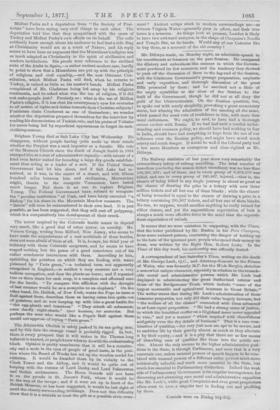A correspondent of last Saturday's Times, writing on the death
of Mr. George Loch, (IC., and Attorney-General to the Prinoo of Wales, who was formerly M.P. for the Wick Burghs, sketches a somewhat unique character, especially in relation to the remark- able moral and administmative powers which Mr. Loch had displayed in administering the great Sutherland estates and' those of the Bridgewater' Trust, which include "some of the. largest mercantile and agricultural interests in Great Britain."' The writer states that during Mr. Loch's administration of these immense properties, not only did their value largely increase, but "the welfare of all the classes" connected with them advanced in at least equal proportion. "1-le had' a strong sense of justice, to which the humblest crofter on a Highland moor never appealed in vain," and yet a manner "which inspired with cheerfulness and gaiety even the dry details of business," That is a rare com- bination of qualities,—for very just men are apt to be severe, and to embitter life by their gravity almost as much as they alleviate it by their equity,—and it is a pity that there are so few means of absorbing men of qualities like these into the public ser- vice. Almost the only avenue to the higher administrative posi- tions in the State, is through Parliament, and even that is a very uncertain one, unless unusual powers of speech happen to be com- bined with unusual powers of a different order, powers much more intrinsically valuable and much more essential to the State, but much less essential to Parliamentary distinction, Indeed the weak side of Parliamentary Government is its singular incompetence for disceruing and attracting rare moral and administrative capacities like Mr. Loch's, while great Companies and even great proprietors often seem to have a singular tact in finding out and profiting by them.






























 Previous page
Previous page